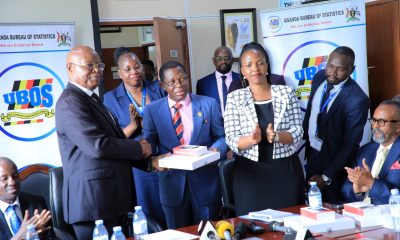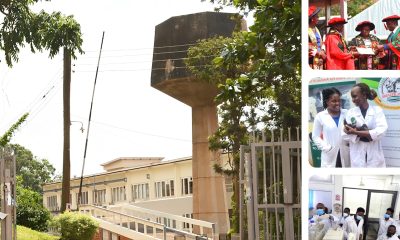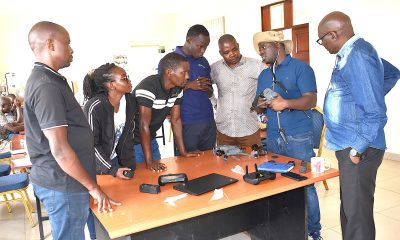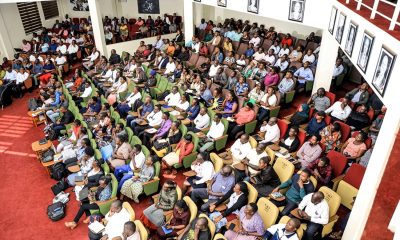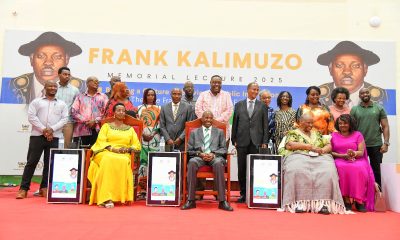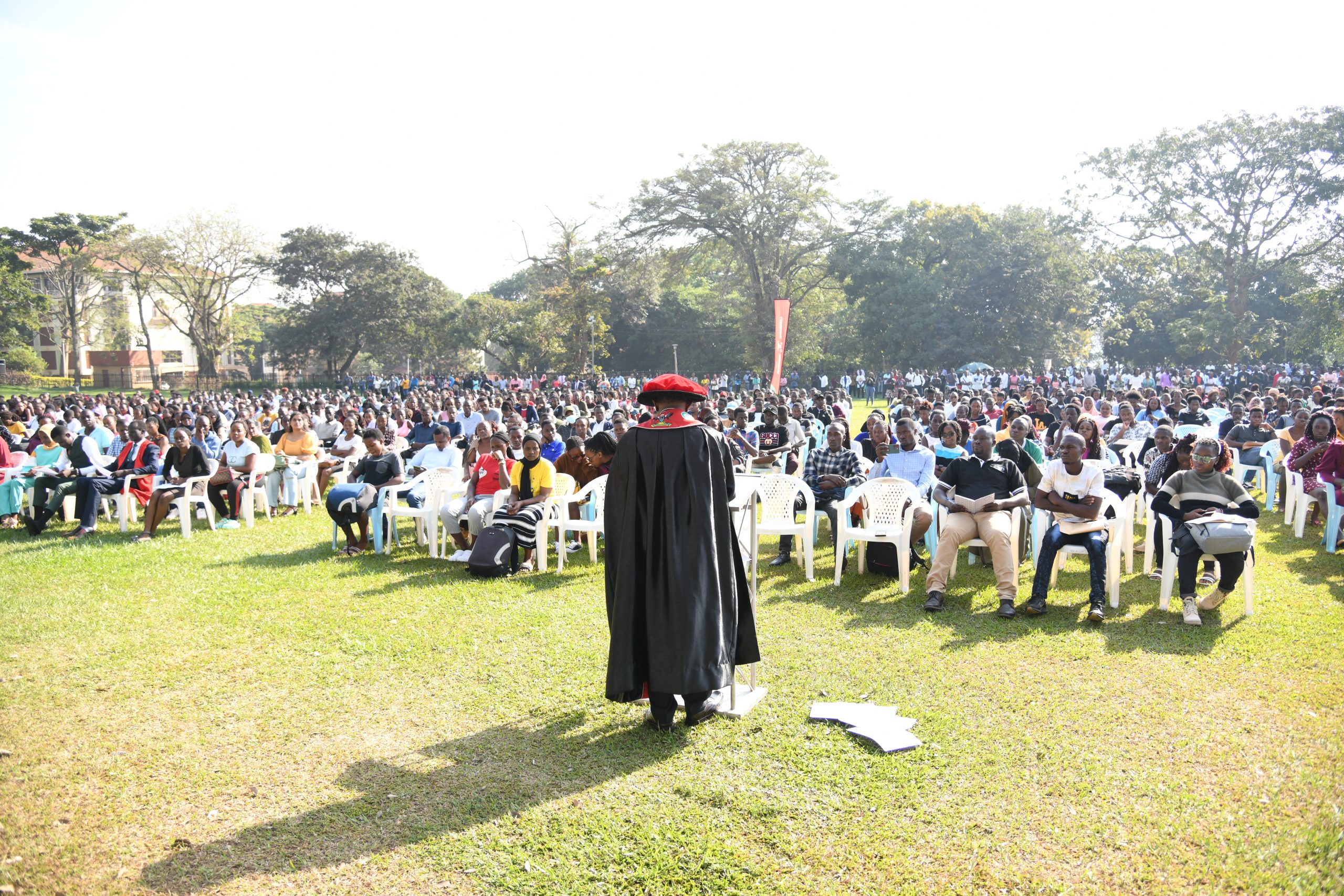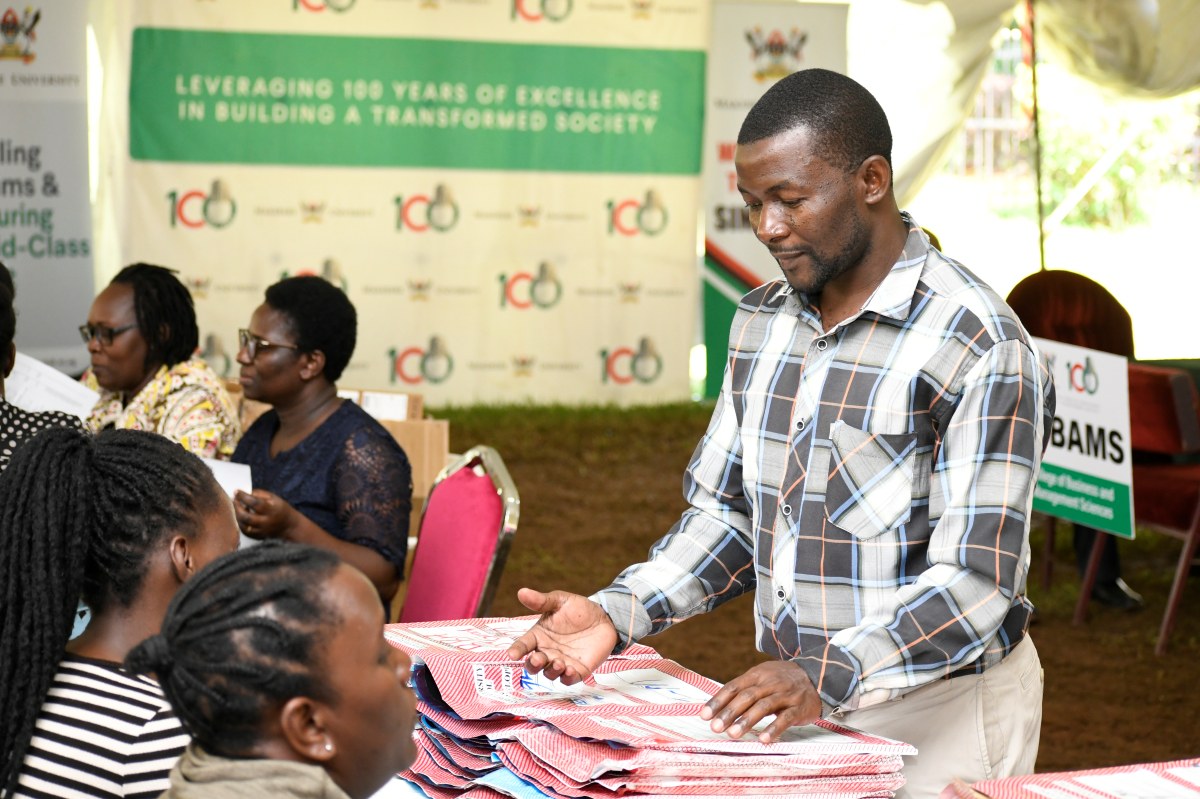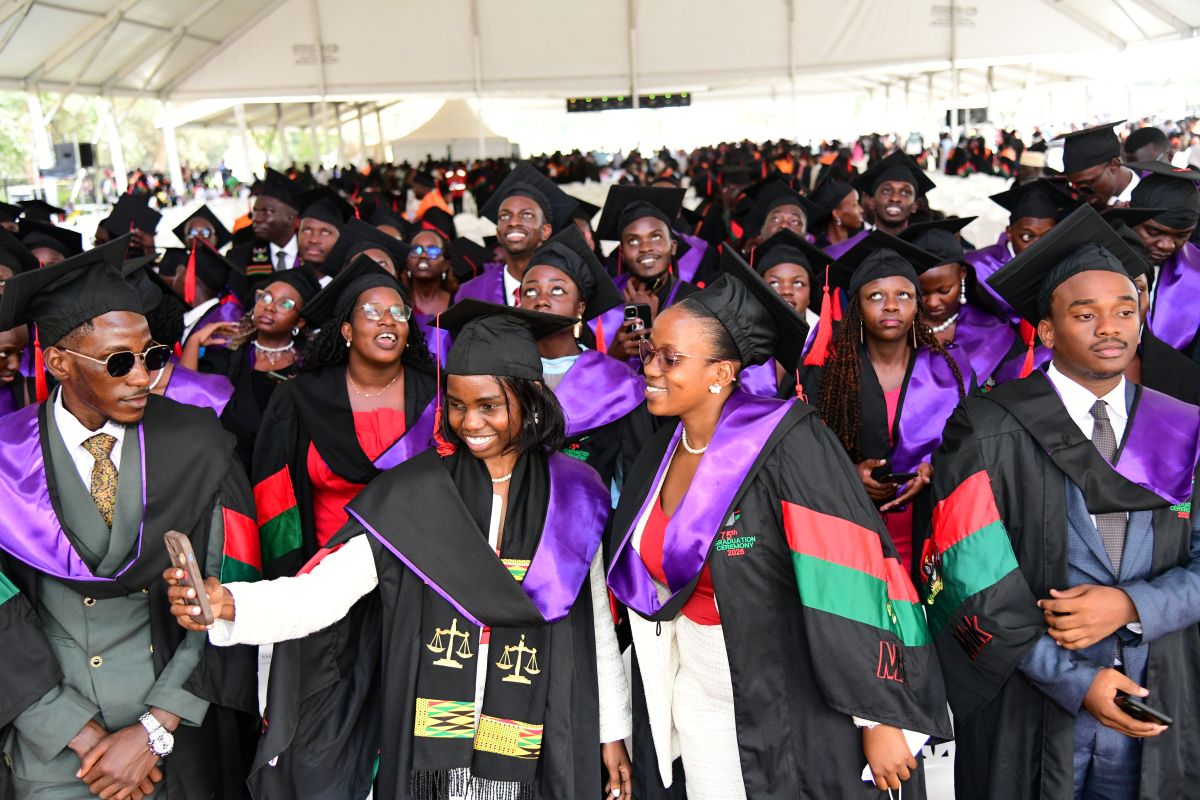The Vice Chancellor, Prof. Barnabas Nawangwe on Thursday 23rd March, 2023 held a press conference to update members of the Media on the progress made in as far as implementing the University’s ten-year strategic plan 2020-2030. The event held in the Council Room, Frank Kalimuzo Central Teaching Facility, was attended by the Deputy Vice Chancellor (Academic Affairs)-Prof. Umar Kakumba, University Secretary-Mr. Yusuf Kiranda, Academic Registrar-Prof. Buyinza Mukadasi and Dean of Students-Mrs. Winifred Kabumbuli.
Also in attendance were; the Director, Gender Mainstreaming Directorate-Dr. Euzobia Mugisha Baine, Manager Counselling and Guidance Services-Mr. Henry Nsubuga, Director Makerere University Innovations Hub-Dr. Cathy Mbidde, Head, Department of Marketing and Management-Assoc. Prof. Peter K. Turyakira, Head, Department of Environment Management-Assoc. Prof. Justine Namaalwa Jjumba and Principal Public Relations Officer-Ms. Ritah Namisango.
The proceedings of the Press Conference follow below;
1. End of Term of the 88th Students’ Guild
I congratulate the Guild President, H.E. Lawrence Alionzi on a very successful albeit short tenure. The 88th Guild Cabinet introduced the Guild Dialogue Series and student community outreach programmes.
2. Strengthening the Safety and Well-being of Students
Makerere University is cognizant of the increasing concerns and emerging needs of addressing risks and safety for Students, Staff and different stakeholders operating within and outside its campus. It acknowledges that students and staff vary in terms of risks of exposure. The University is also aware that providing a Safe and Conducive environment is critical to ensuring that the Staff, University Programmes and Operations run smoothly and effectively to achieve the strategic mission of the University and contribute to the development of our nation.
As a 21st Century Responsive University, Makerere has purposed and is intentional on enhancing its Safety and Well-being measures as one of the pathways to realize our Strategic Vision 2020-2030.
There are some known Risk areas and likely spaces of occurrence including but not limited to:
- Academic/ Learning Spaces
- Accommodation Spaces (within and outside the University Campus)
- Administrative and Support Services Spaces
- Walk ways and other Public Spaces in the University
- Research, Fieldwork and Internship placement spaces
- Campaigns and election of students’ leadership
- Sports and games competitions, among others.
Mechanisms
The University has increasingly instituted mechanisms to improve safety including among others, Policies, Guidelines and their Implementation Frameworks:
- Policy and Regulations against Sexual Harassment (as amended 2018);
- The Gender Equality Policy, 2009 (as amended);
- The Student Regulations, 2018;
- The Human Resource Manual (as amended 2022);
- Policy on Students with Disabilities, 2014 (under review by Council), among others.
Measures
While several measures have been implemented overtime, Makerere University is committed to Strengthening the Safety and well-being in all these spaces. WHY?
- The University has a clearly stipulated Strategic Direction for 2020-2030 whose achievement heavily relies on a safe and conducive ecosystem.
- To continue providing the Human Right of a Safe Environment to Students and Staff
- A Safe Environment is a pre-requisite for a positive mental health to foster a meaningful Academic Journey (SDG No. 3 and SDG No.4)
- Makerere University as a Thought Leader continues to evolve and improve policies and practices to respond to new and emerging challenges affecting students and staff
- To promote dignity and respect among students and staff
The Journey to Enhance Safety and Well-being Targets the Following:
- Development of Makerere University Safeguarding Policy, through a Co-creation Process Championed by the Deputy Vice Chancellor, Academic Affairs.
- It shall be a Student-Centered Policy: Student Leaders and Representative shall be actively engaged in Risk Mapping and identification of desirable actions
- A Confidential and Responsive Reporting and Management Systems shall be established to enable reporting and managing of incidences.
- All Students (Undergraduate and Graduate) as well as Staff (Academic and Administrative) will be called upon to actively participate in this process of formulating the Policy, and later its implementation, Monitoring and Evaluation.
- The University Partners especially Accommodation Facilities will be key stakeholders in this process.
- Mainstreaming Career Guidance and Mentorship Services at Makerere University (starting with the development of a policy framework and capacity building for certified mentorship allies);
- Strengthening the Communications and Public Affairs Arm of the University
- To monitor media publicity about the Institution and act accordingly
- To protect the Institution’s Brand
- Accreditation of Hostels -Alternative Accommodation spaces for Students
- Established a Hostel Accreditation Committee to engage with the Hostel Owners Association
- Memorandum of Understanding (MoU) to be signed between Makerere University and Hostel Owners Association prior to accreditation of Hostels
- Enhancing the Support Services under the Office of Dean of Students
- Established a Grievance Management Desk and appointed a Student Liaison Officer
- A designated point of contact for reporting concerns or incidents.
- Establishment and Operationalization of the Disability Support Center – set up in a phased manner with basic support facilities for students with disabilities.
3. Makerere University Innovations Hub
Introduction
Makerere University has a huge potential for research and innovation which has remained in the University due to lack of support mechanisms. Therefore, Makerere University Innovation Hub was established in August 2022, under Vice Chancellor’s Office as a platform to provide support mechanisms for commercialization of innovations towards sustainable industrialization. The primary beneficiaries are students and staff, while the secondary beneficiaries are government, private sector, community, development partners and civil society.
Current interventions
Since its establishment, the following are the interventions
- Operationalization of the Innovation Hub with space and staff for take-off through development of the strategic plan, guides and mapping key players in the ecosystem.
- UGX 2.7 billion has been allocated to commercialization of innovative projects. 40 projects are going through the process of Intellectual Property Management to commercialize.
- Setting up a state-of-art Innovation Pod with 10 design Labs with support from UNDP.
- Mentoring Future Women Graduates in STEM in Africa with support from Royal Academy of Engineering.
- Creating a platform for Innovative Young Persons with Disabilities in Uganda with support from Royal Academy of Engineering
- Providing advisory services, incubation linkages internal and external stakeholders and space to students and staff.
- Training opportunities to students and community through a) Dream Achiever programme in partnership with Impact Media Consortium, b) Ignite Programme with StartHub Africa, and c) Social Equity Programme with Junior Achievement Uganda.
- International collaborations with a) University of York to support commercialization, capacity building and programme rollout and b) University of Cambridge focusing on Enterprise development programmes for Africa.
The Innovations Hub is located at Makerere University Yusuf Lule Central Teaching Facility.
4. Makerere University introduces Mindset Education Course
Just like any other society that has the desire to grow and develop, Ugandans are seeking change in all aspects of life be it social, political, or economic development. Most underdeveloped countries are facing challenges such as political instability, corruption, poor economic performance, soaring debts, climate vulnerability, etc. all of which are consequences of the inappropriate mindset of the citizens.
Mindset is a set of attitudes or self-perceptions or beliefs people hold about themselves and their abilities. Mindset determines how individuals or groups behave and how they respond to challenging situations. For example, when people believe that the government is responsible for providing them with jobs in order to get a source of income, they are less likely to make an effort to initiate ideas that help them get out of poverty.
In order to establish a change in people’s attitudes, perceptions, or beliefs, Mindset Education has been identified as the remedy to this problem. Mindset Education aims at teaching young people skills on how to respond to the challenges in their everyday lives and to turn challenges into opportunities, building strong minds. It is hoped that the concept of Mind Education will ultimately develop the value of positive thinking that will generate positive attitudes towards work, personal lives and all the other aspects of people’s lives.
It is upon this background that the School of Psychology has developed a course that will be taught to all students admitted to the University, across all academic units on a modular basis. This course will be examined and the results will be included on the academic transcript as an audited course.
Ultimately, we expect this course to promote positive thinking that will generate positive attitudes towards work, build strong minds that will allow our students to overcome life challenges, enhance self-discipline, and inculcate social relationships that nurture respect, compassion, love, and commitment that result in a more fulfilling life.
Mindset Education will be a crosscutting course. The University Management and Senate are involved in the processes to ensure that the University Council and National Council for Higher Education approve the course.
Upon approval, Makerere University will conduct the Mindset Education course in the first semester of the next academic year 2023/2024.
5. Summary Matters Arising from the Question and Answer Session
5.1 Safety of Students with regard to Sexual Harassment
Makerere continues to observe a zero-tolerance policy towards sexual harassment and has transparently outlined disciplinary measures in line with supporting policies. Six staff have been dismissed since 2018 after complaints were filed against them and the cases investigated to conclusion. 30 cases are currently under investigation.
5.2 Accreditation of Hostels and State of Students Halls of Residence
There are more than 70 hostels in the vicinity of the University that accommodate the majority of our students. Whereas the University may not dictate to students where they ought to reside, plans are underway to accredit the facilities. The Dean of Students and Hostel Accreditation Committee are scheduled to meet the Chairperson and Members of the Hostel Owners Association within the coming weeks to discuss the accreditation process.
Maintenance and improvement of infrastructure as well as renovation of Student Halls of Residence is an expensive venture. We therefore thank the Government of Uganda for releasing funds to commence the renovations in a phased approach. We are making every effort to ensure that the renovation of Lumumba Hall commences as soon as possible.
5.3 Patents and Innovations
Several innovations attributed to Makerere University such as the Kiira EV, Vaccines and particularly improved crop varieties continue to improve the livelihoods of the people of Uganda. A lot of research produced by our researchers ought to be commercialized in order to create jobs for our graduates and the youth. Based on the national, continental and global audiences they intend to impact, the 40 projects set to be commercialized under the Makerere University Innovations Hub will undergo Intellectual Property Management procedures with Uganda Registration Services Bureau (URSB), the African Regional Intellectual Property Organization (ARIPO) and the World Intellectual Property Organization (WIPO).
5.4 Research-led status and Undergraduate student population
The drive to become research-led is a comprehensive process that involves playing a greater role in the knowledge economy, boosting knowledge translation and securing more funds to conduct research. Graduate students play an important role in contributing to the body of knowledge. Therefore, gradually increasing the number of graduate students (at Masters level and PhD) will go in tandem with gradual reduction of undergraduate student numbers in the pathway to becoming research-led. These efforts already got underway with the review of the research and innovations policy as well as related policies.
Makerere will also continue to prioritize knowledge translation through the Schools and research centers. The Infectious Diseases Institute (IDI) under the College of Health Sciences is one such center that has distinguished itself in translating research findings into practice in the field. The University will continue to strengthen and increase its international and local agency partnerships so as to tap into more funding, particularly from the research and development budgets of these agencies.
Furthermore, the University’s greatest resource is our academic staff who continue to conduct research and write grant winning proposals. We thank the Government for committing UGX 30 billion annually towards the Makerere University Research and Innovations Fund (Mak-RIF). The University through other avenues such as Mak Holdings intends to convert the University’s land as well as the Intellectual and other properties to generate additional revenue to finance research.
Initiatives such as fully funded PhD scholarships in Engineering as the result of a partnership between Makerere University and King’s College London under the Association of Research Universities in Africa (ARUA) and the Alliance for African Partnerships (AAP) will be encouraged. These hold the potential to facilitate close working relations with industry in order to build research and innovation ecosystems within universities–including training in commercialization and knowledge transfer.
5.5 Enhancing Students’ Welfare
The University Council has approved the Student Work Scheme policy to enable economically disadvantaged students to access job opportunities that can help them pay for their tuition and other needs. For purposes of inclusivity, the scheme will also cater for students with disability and an office has been established to support the implementation of the policy.
To promote mental health and psychological services for the student community, the Counselling and Guidance Centre has established weekly Graduate Support Sessions for postgraduate students. This has been complemented by the training of 120 Counselling Buddies in partnership with the 88th Students’ Guild, to establish a culture of students looking out for other students’ welfare.
5.6 Requirement for Assistant Lecturers to hold a PhD
The University Council has pronounced itself on the need for Assistant Lecturers to hold a PhD within five (5) years. This continues to be the trend that started in the year 2000 following recommendation by the Mujaju report that each Lecturer should hold a PhD. Although only 15% of academic staff had PhDs then, to date, the figure stands at approximately 75%. All Assistant Lecturers on permanent terms of service who had not yet embarked on their PhD studies were reminded to do so and ensure that they have completed their studies by 31st January 2027. The period given by the University Council is fair, given that the normal duration for a PhD is three to five years. To facilitate this process, the University as the employer accords fully paid study leave as well as tuition waivers to staff who enroll on PhD programs at Makerere.
Contributors: Prof. Barnabas Nawangwe-Vice Chancellor, Assoc. Prof. Umar Kakumba-Deputy Vice Chancellor (Academic Affairs), Mr. Yusuf Kiranda-University Secretary, Prof. Buyinza Mukadasi-Academic Registrar, Assoc. Prof. Justine Namaalwa-Program Coordinator of Mastercard Foundation Scholars Program, Dr. Euzobia Mugisha Baine-Director of Gender Mainstreaming, Mrs Winifred Kabumbuli-Dean of Students, Mr. Henry Nsubuga-Manager Counselling and Guidance Centre, Dr. Cathy Mbidde-Director Makerere University Innovations Hub, Dr. Peter Turyakira-Head of Department of Marketing, Ms Ritah Namisango-Principal Public Relations Officer and Dr. Grace Milly Kibanja-Dean, School of Psychology.
Compiled by: Makerere University Public Relations Office
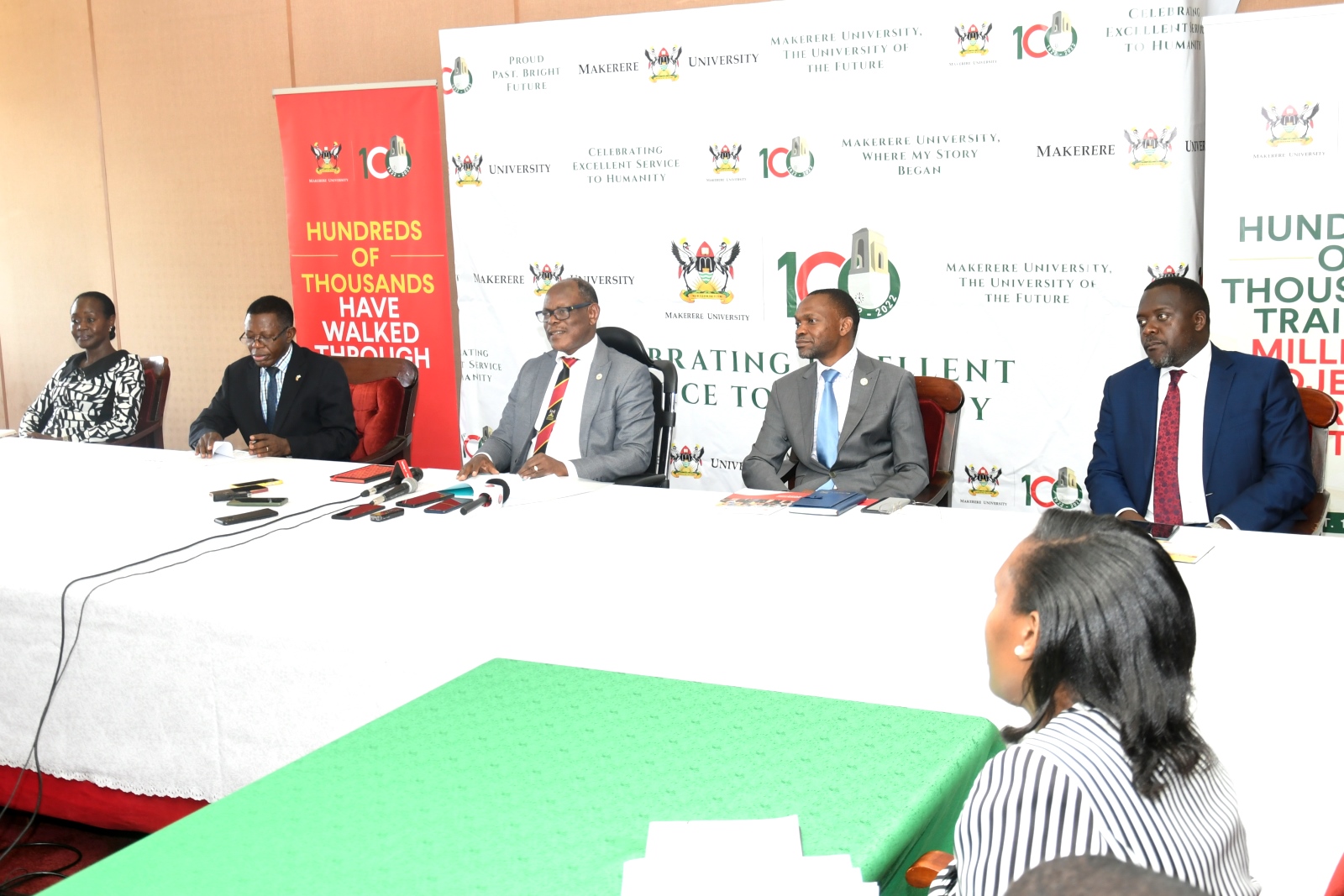

 General7 days ago
General7 days ago
 General1 week ago
General1 week ago
 General3 days ago
General3 days ago
 General2 weeks ago
General2 weeks ago
 General2 weeks ago
General2 weeks ago
